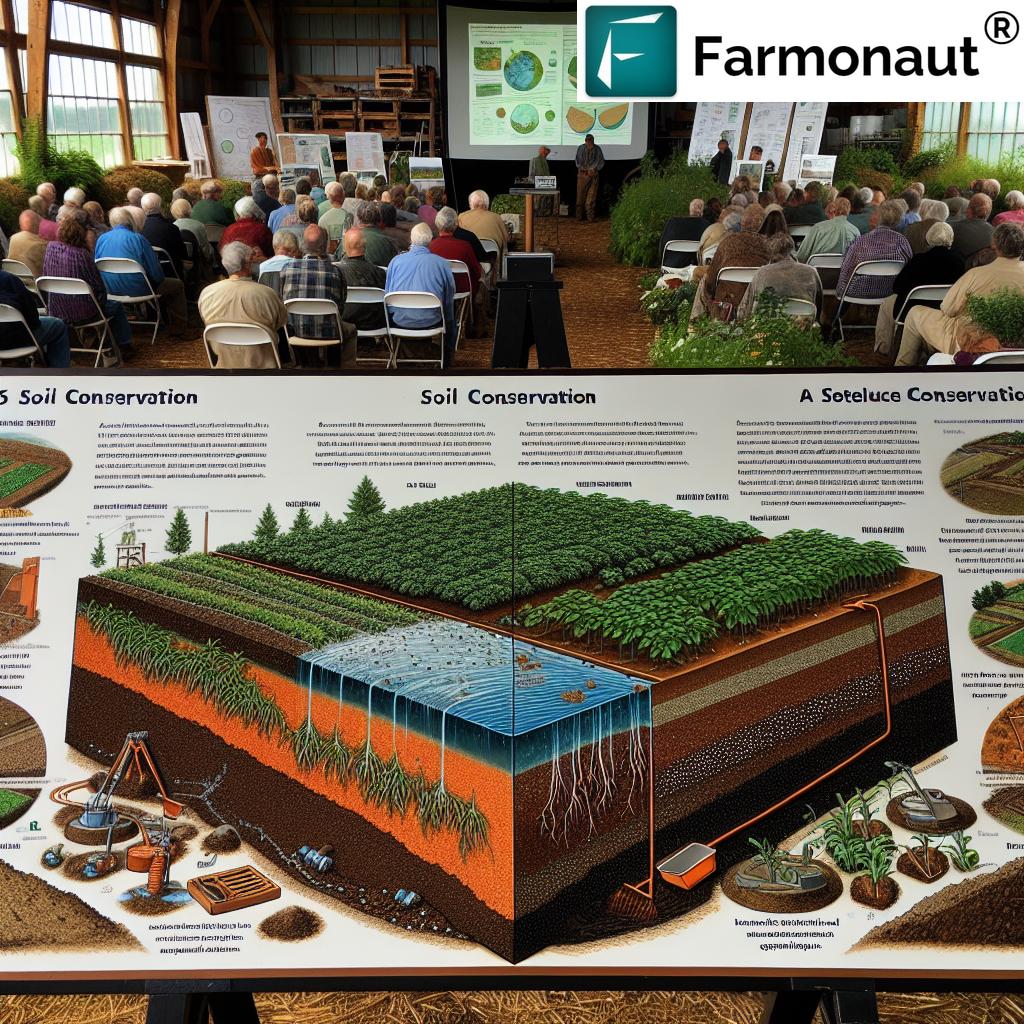Revolutionizing Massachusetts Agriculture: How Farmonaut’s Precision Farming Technologies Boost Soil Conservation and Sustainability

“Massachusetts State Technical Committee collaborates with over 20 stakeholder groups to implement effective agricultural conservation strategies.”
In the heart of New England, Massachusetts agriculture is undergoing a remarkable transformation. As we navigate the challenges of climate change and resource scarcity, the need for sustainable agriculture practices and innovative soil conservation techniques has never been more pressing. In this comprehensive exploration, we delve into the intricate world of farm bill conservation programs and how they’re reshaping the agricultural landscape of the Bay State.
At the forefront of this agricultural revolution is the Massachusetts State Technical Committee, a diverse coalition of experts, farmers, and conservationists working tirelessly to implement effective natural resource management strategies in agriculture. Their collaborative efforts are complemented by cutting-edge precision farming technologies, such as those offered by Farmonaut, which are playing a pivotal role in boosting soil conservation and sustainability.
The Pillars of Sustainable Agriculture in Massachusetts
Sustainable agriculture in Massachusetts rests on several key pillars:
- Soil Conservation: Implementing techniques to prevent erosion and maintain soil health
- Water Management: Efficient irrigation systems and agricultural water conservation practices
- Biodiversity: Promoting diverse ecosystems within agricultural lands
- Precision Farming: Utilizing technology for data-driven decision-making
- Organic Practices: Reducing reliance on synthetic inputs
These pillars form the foundation of the state’s approach to creating a resilient and sustainable agricultural sector. Let’s explore how each of these elements contributes to the broader goals of conservation and sustainability.
The Role of the Massachusetts State Technical Committee
The Massachusetts State Technical Committee serves as a crucial advisory body, bringing together diverse stakeholders to shape the implementation of farm bill conservation programs. This collaborative approach ensures that conservation initiatives are tailored to the unique needs of Massachusetts’ agricultural landscape.
Key responsibilities of the committee include:
- Advising on conservation priorities for the state
- Recommending program criteria and guidelines
- Evaluating and suggesting improvements to existing programs
- Facilitating coordination between various agencies and organizations
By leveraging local expertise and fostering community engagement, the committee plays a vital role in ensuring that conservation efforts are both effective and widely adopted by farmers across the state.
Farm Bill Conservation Programs: A Closer Look
The farm bill conservation programs are the backbone of agricultural conservation efforts in Massachusetts. These programs provide farmers with the resources and incentives needed to implement sustainable practices on their lands. Let’s examine some of the key programs and their impact on Massachusetts agriculture:
| Program Name | Focus Area | Eligibility Criteria | Incentives Offered | Environmental Impact (1-5) | Farmer Participation Rate | Technology Integration |
|---|---|---|---|---|---|---|
| Agricultural Conservation Easement Program | Land Preservation | Landowners with eligible agricultural land | Financial assistance for easement purchase | 5 | 35% | Farmonaut’s satellite monitoring |
| Conservation Stewardship Program | Comprehensive Conservation | Farmers implementing multiple conservation practices | Annual payments for conservation activities | 4 | 40% | Farmonaut’s AI-driven advisory |
| Environmental Quality Incentives Program | Targeted Conservation Practices | Producers addressing specific environmental concerns | Cost-share for implementing practices | 4 | 50% | Farmonaut’s resource management tools |
| Regional Conservation Partnership Program | Collaborative Conservation | Partnerships addressing regional issues | Funding for multi-stakeholder projects | 5 | 30% | Farmonaut’s data integration capabilities |
These programs work in concert to address various aspects of agricultural conservation, from preserving farmland to improving soil health and water quality. The integration of precision farming technologies, such as those offered by Farmonaut, enhances the effectiveness of these programs by providing farmers with data-driven insights for decision-making.
Precision Farming Technologies: Farmonaut’s Contribution
In the realm of precision agriculture, Farmonaut stands out as a pioneering force, offering advanced satellite-based farm management solutions that complement and enhance existing conservation efforts. By leveraging cutting-edge technology, Farmonaut empowers farmers to make informed decisions that optimize resource use and promote sustainability.
Key features of Farmonaut’s technology include:
- Real-time crop health monitoring using satellite imagery
- AI-powered advisory systems for personalized farm management
- Blockchain-based traceability solutions for supply chain transparency
- Resource management tools for efficient allocation of inputs
These technologies align perfectly with the goals of Massachusetts’ conservation programs, providing farmers with the tools they need to implement sustainable practices effectively.
Soil Conservation: The Foundation of Sustainable Agriculture
Soil conservation lies at the heart of sustainable agriculture, and it’s an area where Massachusetts has made significant strides. The state’s farmers, supported by conservation programs and precision farming technologies, are implementing a range of soil conservation techniques:
- Cover Cropping: Planting crops between growing seasons to protect and enrich the soil
- No-Till Farming: Minimizing soil disturbance to maintain soil structure and reduce erosion
- Contour Farming: Plowing and planting across slopes to reduce runoff
- Crop Rotation: Alternating crops to improve soil health and break pest cycles
Farmonaut’s satellite-based monitoring systems play a crucial role in these efforts by providing farmers with detailed insights into soil health and vegetation indices. This data allows for targeted interventions and more efficient resource allocation, ultimately leading to better soil conservation outcomes.
Agricultural Water Conservation: Preserving a Precious Resource
Water is a critical resource in agriculture, and its conservation is paramount for long-term sustainability. Massachusetts farmers are adopting various water conservation practices, supported by both state programs and technological solutions:
- Drip Irrigation: Delivering water directly to plant roots to minimize waste
- Rainwater Harvesting: Collecting and storing rainwater for agricultural use
- Precision Irrigation: Using data to apply water only where and when it’s needed
- Drought-Resistant Crops: Selecting varieties that require less water
Farmonaut’s technology contributes significantly to water conservation efforts by providing real-time data on soil moisture levels and crop water needs. This information enables farmers to make precise irrigation decisions, reducing water waste and improving overall efficiency.
“Farmonaut’s precision farming technologies can help reduce water usage in agriculture by up to 30% through data-driven decision making.”
Organic Farming Methods: Nurturing Natural Ecosystems
Organic farming is gaining traction in Massachusetts as more farmers recognize its benefits for soil health, biodiversity, and overall environmental sustainability. The state’s organic farming initiatives focus on:
- Eliminating synthetic pesticides and fertilizers
- Promoting natural pest control methods
- Enhancing soil fertility through organic matter management
- Preserving and promoting biodiversity on farms
Farmonaut’s advanced remote sensing technology supports organic farmers by providing early detection of pest infestations and nutrient deficiencies, allowing for timely interventions using organic methods. This integration of technology with organic practices demonstrates how modern solutions can enhance traditional sustainable farming techniques.
Watershed Management: Protecting Water Resources
Effective watershed management is crucial for maintaining water quality and quantity in agricultural areas. Massachusetts’ approach to watershed management in agriculture includes:
- Riparian buffer zones to filter runoff
- Wetland restoration and protection
- Erosion control measures along waterways
- Collaborative efforts between farmers and conservation agencies
Farmonaut’s satellite imagery and data analysis capabilities provide valuable insights for watershed management, helping to identify areas at risk of erosion or pollution and guiding the implementation of protective measures.
Explore Farmonaut’s API for advanced agricultural data integration
The Power of Voluntary Participation and Incentives
One of the key strengths of Massachusetts’ conservation programs is their emphasis on voluntary participation and the use of incentives to encourage adoption of sustainable practices. This approach has several benefits:
- Fosters a sense of ownership and commitment among farmers
- Allows for flexibility in implementation based on individual farm needs
- Encourages innovation and experimentation with new conservation techniques
- Builds a community of practice around sustainable agriculture
The combination of financial incentives, technical assistance, and access to cutting-edge technologies like Farmonaut’s platform creates a powerful motivation for farmers to embrace conservation practices.
The Role of Community Engagement in Sustainable Agriculture
Community engagement plays a vital role in the success of Massachusetts’ agricultural conservation efforts. By involving local communities, these initiatives gain broader support and ensure that conservation practices are tailored to local needs and conditions. Key aspects of community engagement include:
- Educational programs and workshops for farmers and community members
- Collaborative decision-making processes for conservation priorities
- Support for local food systems and farm-to-table initiatives
- Volunteer opportunities for conservation projects
Farmonaut contributes to community engagement by providing accessible, user-friendly tools that demystify precision agriculture and make it more approachable for a wider range of stakeholders.
The Future of Sustainable Agriculture in Massachusetts
As we look to the future, the integration of conservation programs, precision farming technologies, and community engagement promises to drive continued progress in sustainable agriculture across Massachusetts. Some key trends and developments to watch include:
- Increased adoption of AI and machine learning in farm management
- Greater emphasis on carbon sequestration and climate resilience
- Expansion of urban and peri-urban agriculture initiatives
- Further integration of blockchain technology for supply chain transparency
Farmonaut is at the forefront of these developments, continuously innovating to provide farmers with the tools they need to meet the challenges of tomorrow’s agriculture.

Conclusion: A Sustainable Future for Massachusetts Agriculture
The journey towards a more sustainable and resilient agricultural sector in Massachusetts is well underway. Through the collaborative efforts of the Massachusetts State Technical Committee, innovative farmers, and technology providers like Farmonaut, the state is making significant strides in soil conservation, water management, and overall agricultural sustainability.
By embracing precision farming technologies, implementing robust conservation programs, and fostering community engagement, Massachusetts is setting a powerful example for sustainable agriculture in the 21st century. As we continue to face environmental challenges, the lessons learned and successes achieved in the Bay State will undoubtedly serve as a beacon for agricultural communities across the nation and around the world.
The future of Massachusetts agriculture is bright, sustainable, and technologically empowered. With continued innovation, collaboration, and commitment to conservation, we can look forward to a thriving agricultural sector that not only feeds our communities but also nurtures and protects our precious natural resources for generations to come.
Frequently Asked Questions (FAQ)
- What are the main farm bill conservation programs in Massachusetts?
The main programs include the Agricultural Conservation Easement Program, Conservation Stewardship Program, Environmental Quality Incentives Program, and Regional Conservation Partnership Program. - How does Farmonaut’s technology contribute to soil conservation?
Farmonaut’s satellite-based monitoring provides real-time data on soil health and vegetation indices, allowing farmers to make informed decisions about resource allocation and conservation practices. - What are some key sustainable agriculture practices promoted in Massachusetts?
Key practices include cover cropping, no-till farming, precision irrigation, organic farming methods, and watershed management techniques. - How can farmers participate in Massachusetts conservation programs?
Farmers can participate by contacting their local USDA Service Center or the Massachusetts State Technical Committee for information on available programs and application processes. - What role does community engagement play in agricultural conservation efforts?
Community engagement is crucial for tailoring conservation efforts to local needs, providing educational opportunities, and fostering support for sustainable agriculture initiatives.




